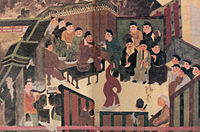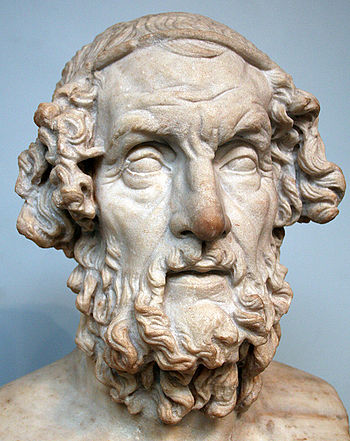Portal:Poetry
Welcome to the Poetry Portal


Poetry (a term derived from the Greek word poiesis, "making"), also called verse, is a form of literature that uses aesthetic and often rhythmic qualities of language − such as phonaesthetics, sound symbolism, and metre − to evoke meanings in addition to, or in place of, a prosaic ostensible meaning. A poem is a literary composition, written by a poet, using this principle.
Poetry has a long and varied history, evolving differentially across the globe. It dates back at least to prehistoric times with hunting poetry in Africa and to panegyric and elegiac court poetry of the empires of the Nile, Niger, and Volta River valleys. Some of the earliest written poetry in Africa occurs among the Pyramid Texts written during the 25th century BCE. The earliest surviving Western Asian epic poem, the Epic of Gilgamesh, was written in the Sumerian language.
Early poems in the Eurasian continent evolved from folk songs such as the Chinese Shijing as well as from religious hymns (the Sanskrit Rigveda, the Zoroastrian Gathas, the Hurrian songs, and the Hebrew Psalms); or from a need to retell oral epics, as with the Egyptian Story of Sinuhe, Indian epic poetry, and the Homeric epics, the Iliad and the Odyssey. (Full article...)
Selected article

Fu (Chinese: 賦), variously translated as rhapsody or poetic exposition, is a form of Chinese rhymed prose that was the dominant literary form during the Han dynasty. Fu are poetic pieces in which an object, feeling, or subject is described and rhapsodized in exhaustive detail and from as many angles as possible. Classical fu composers attempted to use as wide a vocabulary as they could, and often included great numbers of rare and archaic terms in their compositions. Fu poems employ alternating rhyme and prose, varying line length, close alliteration, onomatopoeia, loose parallelism, and extensive cataloging of their topics.
Unlike the songs of the Classic of Poetry (Shijing) or the Verses of Chu (Chu ci), fu were meant to be recited aloud or chanted but not sung. The fu genre came into being around the 2nd and 3rd centuries BC and continued to be regularly used into the Song dynasty. Fu were used as grand praises for the imperial courts, palaces, and cities, but were also used to write "fu on things", in which any place, object, or feeling was rhapsodized in exhaustive detail. The largest collections of historical fu are the Selections of Refined Literature (Wen xuan), the Book of Han (Han shu), the New Songs from the Jade Terrace (Yutai xinyong), and official dynastic histories.
There is no counterpart or similar form to the fu genre in Western literature. During a large part of the twentieth century, fu poetry was harshly criticized by Chinese scholars as excessively ornate, lacking in real emotion, and ambiguous in its moral messages. Because of these historical associations, scholarship on fu poetry in China almost ceased entirely between 1949 and the end of the Cultural Revolution in 1976. Since then, study of fu has gradually returned to its previous level. (Full article...)
Selected image
Poetry WikiProject

Selected biography
Maya Angelou (/ˈmaɪ.ə ˈændʒəloʊ/; born Marguerite Annie Johnson; April 4, 1928 – May 28, 2014) was an African-American author, poet, dancer, actress, and singer. She published seven autobiographies, three books of essays, and several books of poetry, and was credited with a list of plays, movies, and television shows spanning more than 50 years. She received dozens of awards and over fifty honorary degrees. Angelou is best known for her series of seven autobiographies, which focus on her childhood and early adult experiences. The first, I Know Why the Caged Bird Sings (1969), tells of her life up to the age of seventeen and brought her international recognition and acclaim.
She became a poet and writer after a series of occupations as a young adult, including fry cook, prostitute, nightclub dancer and performer, cast member of the opera Porgy and Bess, coordinator for the Southern Christian Leadership Conference, and journalist in Egypt and Ghana during the decolonization of Africa. She was an actor, writer, director, and producer of plays, movies, and public television programs. From 1982, she taught at Wake Forest University in Winston-Salem, North Carolina, where she held the first lifetime Reynolds Professorship of American Studies. She was active in the Civil Rights Movement, and worked with Martin Luther King Jr. and Malcolm X. Beginning in the 1990s, she made around 80 appearances a year on the lecture circuit, something she continued into her eighties. In 1993, Angelou recited her poem "On the Pulse of Morning" (1993) at President Bill Clinton's inauguration, making her the first poet to make an inaugural recitation since Robert Frost at President John F. Kennedy's inauguration in 1961. (Full article...)
Did you know (auto-generated) -

- ... that Eyvindur P. Eiríksson has addressed modern alienation and man's relationship with nature through pagan poetry and a book about a fishing trawler?
- ... that the frequently plagiarized poems "Candidate for a Pullet Surprise" and "A Grandchild's Guide to Using Grandpa's Computer" are often cited in discussions of internet publishing ethics?
- ... that Ahmet Cevat Emre shared a household with Vâlâ Nureddin and Nâzım Hikmet in Batumi, with Emre responsible for cooking, Hikmet writing poetry and Nureddin giving Turkish language lessons?
- ... that Iraqi poet Isa Hasan al-Yasiri ran away from school at 10 years old, before travelling with a camel caravan overnight to another village?
- ... that Ida Ospelt-Amann led the revival of dialect poetry in Liechtenstein and was awarded the Golden Cross of Merit?
- ... that after civil rights activist Andrew Goodman was murdered, Mary Doyle Curran found and published a poem that Goodman had written for her class?
Selected poem
| A Flower Given to My Daughter by James Joyce |
|---|
|
Frail the white rose and frail are
Her hands that gave Rosefrail and fair-- yet frailest |
Related portals
Topics
Recognized content
Categories
Associated Wikimedia
The following Wikimedia Foundation sister projects provide more on this subject:
-
Commons
Free media repository -
Wikibooks
Free textbooks and manuals -
Wikidata
Free knowledge base -
Wikinews
Free-content news -
Wikiquote
Collection of quotations -
Wikisource
Free-content library -
Wikiversity
Free learning tools -
Wiktionary
Dictionary and thesaurus






















